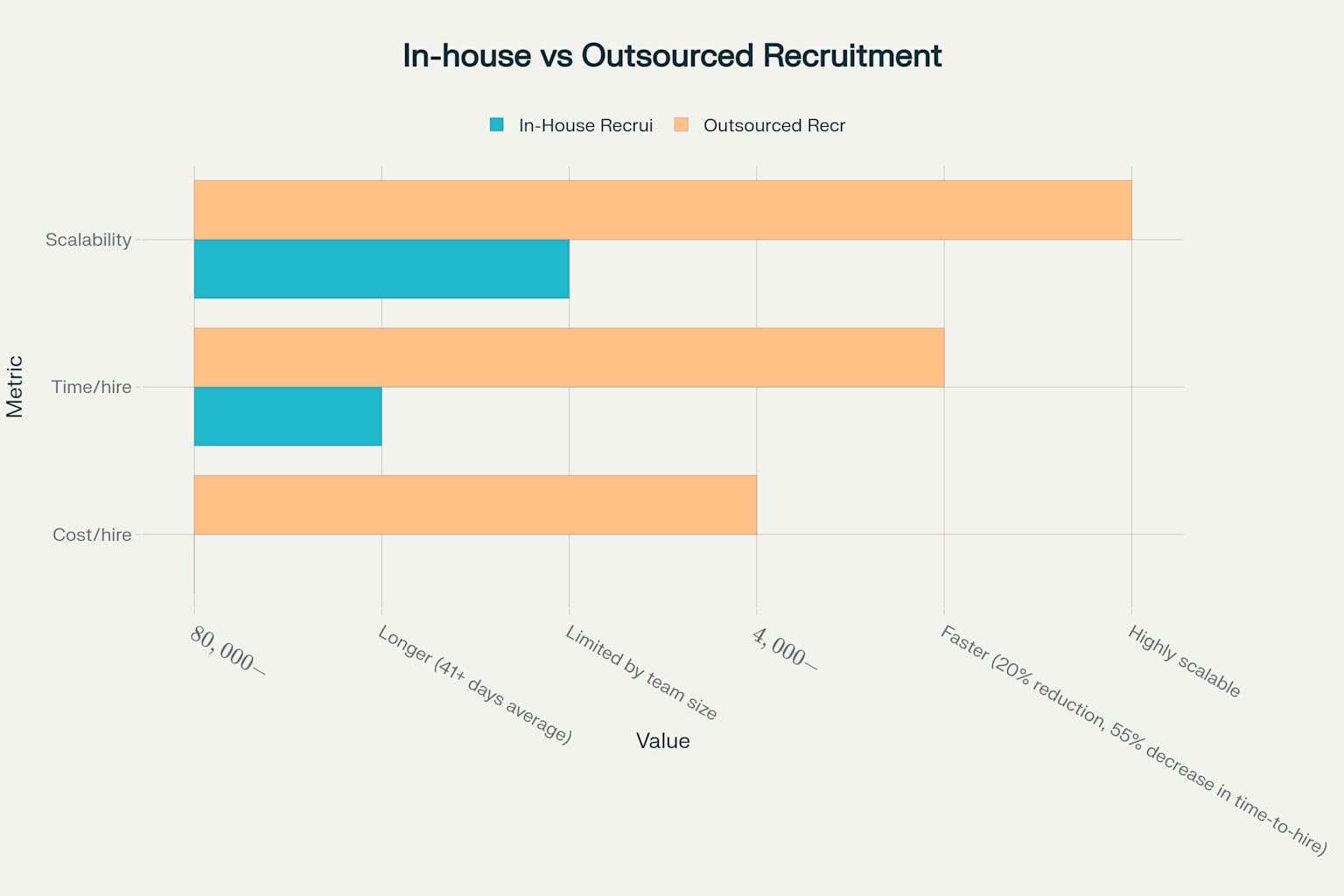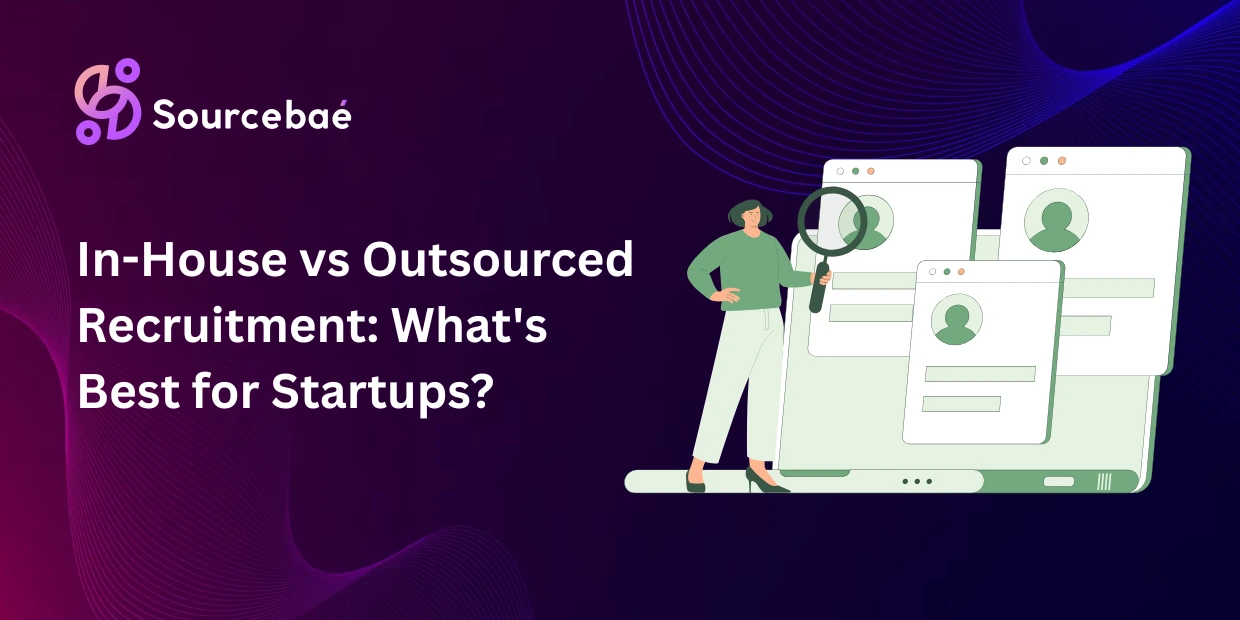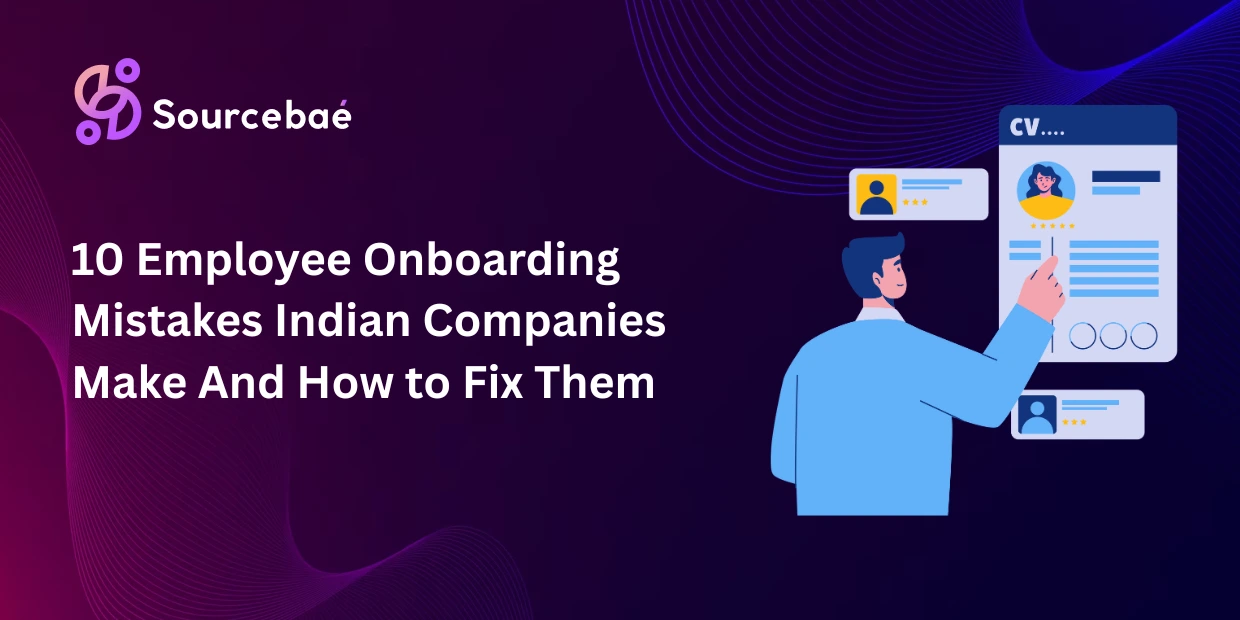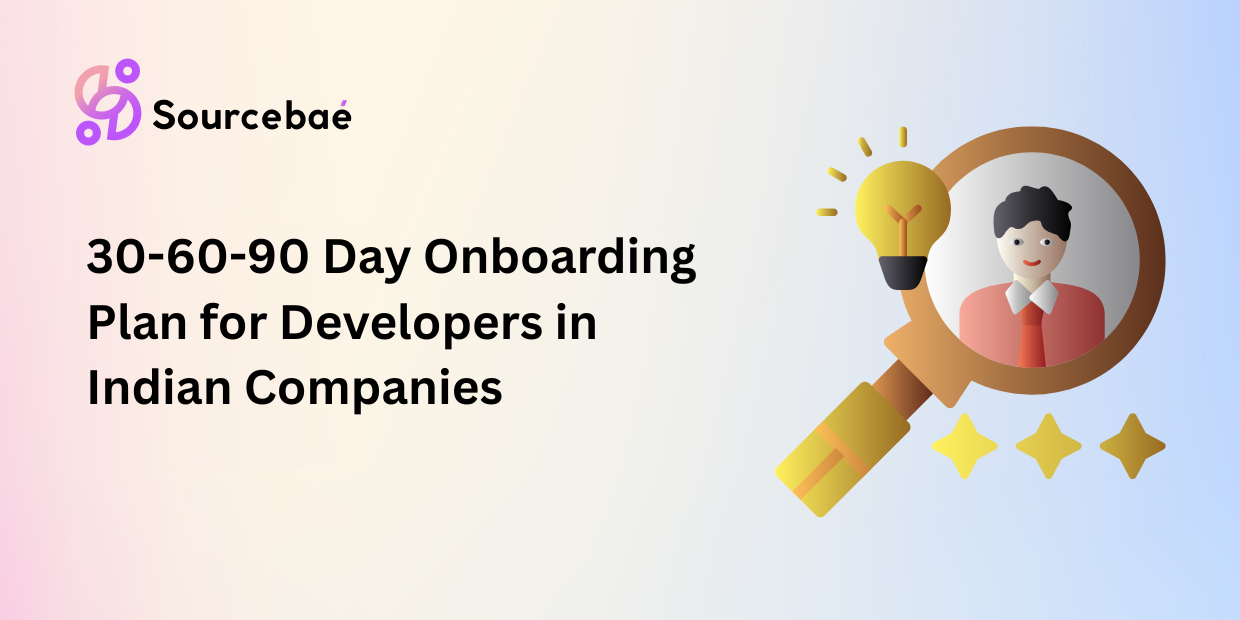Choosing the right recruitment strategy can make or break a startup’s growth trajectory. With 72% of startups facing significant hiring challenges1 and the average cost per hire reaching $4,000, the decision between building an in-house recruitment team or outsourcing to external agencies has never been more critical. This comprehensive guide explores both approaches to help startup founders make informed decisions that align with their growth goals and budget constraints. Comparison of In-House vs Outsourced Recruitment for Startups:

Understanding Your Recruitment Options
What is In-House Recruitment?
In-house recruitment involves building an internal team of recruiters who work exclusively for your startup. These dedicated professionals handle every aspect of the hiring process, from posting job descriptions to onboarding new employees. They become deeply integrated with your company culture and understand your specific hiring needs.
What is Outsourced Recruitment?
Outsourced recruitment, including Recruitment Process Outsourcing (RPO), involves partnering with external agencies to handle some or all aspects of your hiring process. These specialized providers act as an extension of your HR department, offering access to broader talent pools and recruitment expertise1.
The In-House Recruitment Advantage
Complete Control and Customization
In-house recruitment offers complete control over your hiring process. Your internal team can tailor recruitment strategies to align perfectly with your company’s specific needs and culture. This level of customization often leads to better candidate-company fit, which is crucial for startup success.
Deep Company Knowledge
Internal recruiters develop an in-depth understanding of your company’s values, goals, and work environment. This knowledge enables them to identify candidates who not only possess the required skills but also align with your startup’s unique culture and vision.
Long-term Cost Savings
While initial setup costs are high, in-house recruitment can lead to significant cost savings in the long run. Companies avoid paying external agency fees, which can be substantial, especially for startups making multiple hires throughout the year.
Direct Communication
With an in-house team, communication is more direct and efficient. There’s no intermediary between your hiring managers and recruiters, which can speed up the hiring process and reduce misunderstandings that often occur with external partners.
The Drawbacks of In-House Recruitment
Resource Intensive Requirements
Building an in-house recruitment team requires significant resources. The average annual cost for a dedicated recruiter ranges from $80,000 to $150,000, not including benefits, training, and infrastructure costs. For cash-strapped startups, this represents a substantial investment.
Limited Talent Pool Access
Internal recruiters often have limited reach compared to established recruitment agencies. They rely primarily on internal networks and may struggle to access passive candidates or specialized talent pools that external agencies have cultivated over years.
Slower Initial Setup
Establishing an effective in-house recruitment function takes time. The average time to fill a position is 41 days, and building internal expertise can extend this timeline further, potentially causing critical hiring delays.
The Outsourced Recruitment Advantage
Cost-Effective Solutions
Outsourced recruitment offers significant cost advantages. Companies using RPO services report a 20% reduction in cost-per-hire1, with average costs ranging from $4,000 to $12,500 per hire compared to the annual salary commitments required for in-house teams.
Access to Extensive Networks
External recruiters have established networks and access to wider talent pools, including passive candidates. They can tap into extensive databases, social media networks, and professional connections that startups might not have access to independently.
Specialized Expertise
Recruitment agencies possess domain-specific knowledge and expertise. They understand market trends, salary benchmarks, and industry-specific requirements that can significantly improve the quality of candidates presented to startups.
Faster Time-to-Hire
RPO providers deliver 55% faster time-to-hire1 compared to traditional in-house methods. This speed advantage is crucial for startups that need to scale quickly or fill critical positions rapidly.
Scalability and Flexibility
Outsourced recruitment offers unmatched scalability. Startups can ramp up or down their hiring efforts based on immediate needs without the long-term commitment of maintaining a full-time internal team.
The Challenges of Outsourced Recruitment
Limited Control Over Process
With outsourced recruitment, startups have reduced control over the hiring process. External agencies may not fully understand your company culture or may prioritize speed over cultural fit, potentially leading to mismatched hires.
Potential Quality Variations
The quality of outsourced recruitment depends heavily on the provider. Some agencies may focus on quantity over quality, leading to a higher volume of candidates but potentially lower overall fit with your startup’s specific requirements.
Communication Barriers
Working with external agencies can create communication challenges. There may be delays in feedback, misunderstandings about requirements, or less responsive communication compared to internal teams.
When to Choose In-House Recruitment
High-Volume Hiring Needs
Consider in-house recruitment when you anticipate hiring 5-10 people per quarter consistently. At this volume, the cost of an internal recruiter becomes more economical than paying agency fees for multiple hires.
Culture-Critical Positions
If cultural fit is paramount to your startup’s success, in-house recruitment provides the deep company knowledge necessary to identify candidates who will thrive in your specific environment.
Long-term Hiring Strategy
For startups with predictable, ongoing hiring needs, building an internal team creates long-term value and institutional knowledge that benefits the organization over time.
Sufficient Resources Available
Choose in-house recruitment when you have the budget and resources to support a dedicated team, including salary, benefits, training, and technology infrastructure.
When to Choose Outsourced Recruitment
Limited Budget Constraints
Startups operating with tight budgets should consider outsourcing. The pay-per-hire model allows better cash flow management compared to the fixed costs of internal staff.
Specialized Role Requirements
For niche or highly technical positions, external agencies often have better access to specialized talent pools and industry-specific expertise.
Rapid Scaling Needs
When startups need to scale quickly, outsourced recruitment provides the flexibility and speed necessary to meet aggressive hiring timelines1.
Lack of Internal HR Expertise
Early-stage startups without established HR functions benefit from the expertise and processes that professional recruitment agencies provide.
The Hybrid Approach: Best of Both Worlds
Many successful startups adopt a hybrid recruitment model that combines the benefits of both approaches:
Strategic Role Allocation
Use in-house recruiters for core positions and cultural fit roles, while outsourcing specialized or high-volume hiring to external agencies.
Flexible Resource Management
Maintain a small internal team for ongoing needs while partnering with agencies for peak hiring periods or specialized searches.
Cost Optimization
This approach allows startups to optimize costs by using internal resources for routine hiring while leveraging external expertise for complex searches.
Key Statistics and Benchmarks
| Metric | Value | Impact |
|---|---|---|
| Average cost per hire (startups) | $4,000 | Budget planning baseline |
| Time to fill position (average) | 41 days | Timeline expectations |
| Startups facing hiring challenges | 72%1 | Market reality |
| Candidate expectations for process | 1-2 weeks | Speed requirements |
| Cost reduction with RPO | 20%1 | Potential savings |
| Time reduction with RPO | 55%1 | Efficiency gains |
Making Your Decision: A Practical Framework
Assess Your Current Situation
Budget Analysis: Calculate your available hiring budget and compare the total cost of ownership for each approach.
Hiring Volume: Determine your expected hiring volume over the next 12-18 months.
Expertise Gap: Evaluate your internal HR and recruitment capabilities.
Consider Your Growth Stage
Early Stage (1-10 employees): Outsourcing typically provides better value and flexibility.
Growth Stage (10-50 employees): Hybrid approach often works best.
Scale Stage (50+ employees): In-house recruitment becomes more cost-effective.
Evaluate Success Metrics
Define how you’ll measure recruitment success, including time-to-hire, cost-per-hire, quality of hire, and cultural fit.
Best Practices for Implementation
For In-House Recruitment
Start with Generalists: Hire recruiters who can handle multiple roles rather than specialists.
Invest in Technology: Implement robust Applicant Tracking Systems (ATS) and recruitment tools.
Build Internal Networks: Encourage employee referrals and networking.
Develop Clear Processes: Create standardized interview processes and evaluation criteria.
For Outsourced Recruitment
Choose the Right Partner: Select agencies with startup experience and cultural alignment1.
Maintain Clear Communication: Establish regular check-ins and feedback loops.
Set Expectations: Define quality standards and success metrics upfront.
Stay Involved: Remain engaged in the process while leveraging external expertise.
Future-Proofing Your Recruitment Strategy
Embrace Technology
AI-powered tools are becoming increasingly important in recruitment. Whether you choose in-house or outsourced recruitment, ensure your approach incorporates modern technology for candidate sourcing, screening, and assessment.
Focus on Candidate Experience
55% of candidates expect the hiring process to take 1-2 weeks. Regardless of your chosen approach, prioritize creating a positive, efficient candidate experience that reflects well on your startup brand.
Plan for Remote and Hybrid Work
With remote and hybrid work becoming standard, ensure your recruitment strategy can effectively identify and assess candidates for distributed teams.
Conclusion
The choice between in-house and outsourced recruitment isn’t binary—it’s about finding the right fit for your startup’s unique circumstances. In-house recruitment offers control, cultural alignment, and long-term cost benefits but requires significant upfront investment. Outsourced recruitment provides speed, expertise, and cost efficiency but with less control over the process.
Most successful startups benefit from a strategic hybrid approach that leverages the strengths of both models. Start by honestly assessing your budget, hiring volume, and internal capabilities. Consider beginning with outsourced recruitment for immediate needs while building internal capacity for long-term growth.
Remember, the best recruitment strategy is one that evolves with your startup. What works at 10 employees may not work at 100. Stay flexible, measure your results, and be prepared to adapt your approach as your startup scales and your needs change.
The key to success lies not in choosing the “perfect” approach, but in implementing your chosen strategy effectively and continuously optimizing based on results. Whether you build, buy, or blend your recruitment capabilities, focus on creating a hiring process that attracts top talent and supports your startup’s growth objectives.






